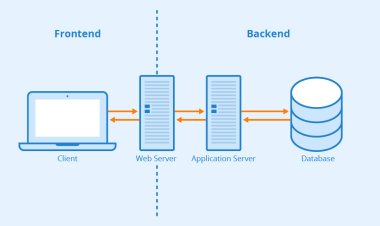React Native vs Flutter
React Native vs Flutter is a battle of two of the most popular mobile development frameworks. React Native has been around longer, but Flutter has gained popularity in recent years. So, which one should you use?

React Native vs. Flutter: Which is better for cross-platform development?
The debate between React Native and Flutter is one that has been ongoing for some time now. Both are great choices for cross-platform development, but which one is the better option?
React Native is a framework that was created by Facebook. It allows developers to create native apps for both iOS and Android using the same codebase. React Native has a large community and is used by some big names, such as Facebook, Instagram, and Airbnb.
Flutter is a framework created by Google. It allows developers to create native apps for both iOS and Android using the same codebase. Flutter has a growing community and is used by some big names, such as Alibaba and Google Maps.
So, which one is the better option? React Native or Flutter?
There is no clear winner in this debate. Both React Native and Flutter have their pros and cons. It really depends on your specific needs as a developer.
If you're looking for a framework that is more widely used and has a larger community, then React Native is the better choice. If you're looking for a framework that is backed by a big name like Google, then Flutter is the better choice.
Ultimately, the decision comes down to personal preference. Both React Native and Flutter are great choices for cross-platform development.
A comparison of the two frameworks from the perspective of a mobile developer.
When it comes to mobile development, there are two popular frameworks that usually come to mind: React Native and Flutter. Both offer a great way to develop cross-platform mobile apps, but which one is better?
From a mobile developer's perspective, React Native has a few advantages. First, it uses JavaScript, which is a language that many developers are already familiar with. Second, React Native apps tend to have a more native feel to them since they use native UI components.
However, Flutter also has its own share of benefits. One big advantage is that it uses Dart, a language that is easy to learn for those who are not familiar with JavaScript. Additionally, Flutter apps can be compiled to run on both iOS and Android, giving you more flexibility when it comes to deployment.
So, which one should you choose? Ultimately, it depends on your own preferences and skillset. If you're already familiar with JavaScript, then React Native might be the better choice. However, if you're looking for an easy-to-learn language and more flexibility when it comes to deployment, then Flutter might be a better fit.
The pros and cons of React Native and Flutter.
When it comes to cross-platform mobile development, there are two primary frameworks that developers use: React Native and Flutter. React Native, which is developed by Facebook, allows developers to create native mobile applications using JavaScript. Flutter, on the other hand, is developed by Google and uses the Dart programming language.
Both React Native and Flutter have their pros and cons, and which one you choose will ultimately depend on your specific needs and preferences. In this article, we'll take a look at the pros and cons of React Native and Flutter so you can decide which framework is right for you.
React Native Pros:
-Allows developers to create native mobile applications using a single codebase.
-Has a large and active community of developers.
-Is backed by Facebook.
-Many well-known companies use React Native, including Instagram, Airbnb, and Walmart.
React Native Cons:
-May not be suitable for complex applications.
-Can be slower than native applications.
Flutter Pros:
-Uses the Dart programming language, which is easy to learn for those with JavaScript experience.
-Creates smooth and responsive user interfaces.
-Is backed by Google.
-Has a growing community of developers.
Flutter Cons:
-Is still in its early stages of development.
-May not be suitable for large and complex applications.
What are the differences between React Native and Flutter?
There are a few key differences between React Native and Flutter. First, React Native uses JavaScript while Flutter uses Dart. This can be a big difference for some developers, as Dart can be a bit more challenging to learn than JavaScript.
Another key difference is that React Native uses a traditional app layout with a JavaScript bridge, while Flutter uses a more unique approach with its own rendering engine. This means that Flutter apps can generally be more performant than React Native apps.
Finally, React Native has a more mature ecosystem with a larger community, while Flutter is still relatively new. This means that there are more resources available for React Native developers, but it also means that Flutter apps may have more bugs and be less stable overall.
How do React Native and Flutter compare in terms of performance?
There are a few key ways in which React Native and Flutter compare when it comes to performance. First, React Native generally has better performance when compared to Flutter. This is due to the fact that React Native uses a JavaScript bridge to communicate with native components, which can lead to better performance. However, this is not always the case and there are some instances where Flutter can outperform React Native.
Second, Flutter's Dart programming language can provide better performance than React Native's JavaScript. This is because Dart is a compiled language, which means that it can run more quickly than interpreted languages like JavaScript.
Finally, React Native has more mature tooling and support from the developer community. This means that there are more options for debugging and optimizing React Native apps, which can lead to better performance.
Which framework is more suitable for developing native apps?
for Android and iOS, Flutter or React Native?
There is no definitive answer to this question as both Flutter and React Native have their own pros and cons. However, if we had to choose one, we would say that Flutter is more suitable for developing native apps for Android and iOS.
Some of the reasons why we think so include the following:
- Flutter offers more control over the UI and the overall look and feel of the app. This is because it uses its own widgets, which can be customized to a greater extent than React Native's.
- Flutter apps are generally faster and smoother than those built with React Native. This is due to the fact that Flutter uses Dart, a language that is compiled to native code, whereas React Native uses JavaScript, which is interpreted by the JavaScript engine.
- Flutter apps have a more native feel to them, as they are not reliant on webview components. This is because they are rendered directly on the platform's UI rendering engine.
- Finally, Flutter is still in its early stages of development, which means that there is more potential for it to grow and improve over time. React Native, on the other hand, has been around for longer and is thus more mature.
Why React Native or Flutter could be the best choice for your next project.
If you're looking for a mobile app development platform that offers high performance and a smooth user experience, React Native or Flutter could be the best choice for your next project.
React Native is a cross-platform framework that allows you to develop native mobile apps using JavaScript. React Native apps are faster and more responsive than traditional native apps, and they offer a more native user experience.
Flutter is a mobile app SDK that allows you to create high-quality native apps for iOS and Android. Flutter apps are faster and more responsive than traditional native apps, and they offer a more native user experience.
Both React Native and Flutter offer a number of advantages over other mobile app development platforms, including a high degree of performance and a smooth user experience. If you're looking for a platform that will allow you to create a high-quality mobile app, React Native or Flutter could be the best choice for your next project.
Conclusion.
React Native and Flutter are two popular mobile development frameworks. React Native is a JavaScript-based framework, while Flutter uses the Dart programming language.
Both frameworks have their pros and cons, but React Native is generally considered to be the more stable and reliable platform, while Flutter is faster and easier to learn.

















